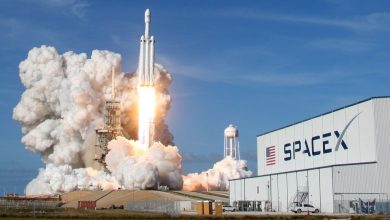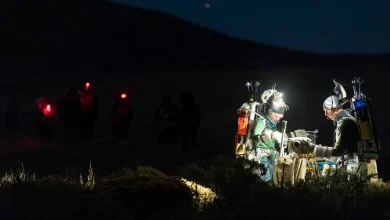Financial Times: Investment in Military Tech Startups Is Booming in US
الفاينانشال تايمز: تكنولوجيا الدفاع تشهد طفرة استثمارية في الشركات الناشئة في الولايات المتحدة
QNA
London: Investment in military tech startups is booming as the war in Ukraine and geopolitical tensions lead to growing confidence that the US government will give lucrative contracts to Silicon Valley companies making cutting-edge defence systems, UK’s (Financial Times) said.
US venture capitalists have agreed more than 200 defence and aerospace deals in the first five months of this year worth nearly $17 billion more than the sector raised during the entire of 2019, the Financial Times said citing data from PitchBook.
This boom has mirrored the gold rush also experienced by the artificial intelligence sector, even as investment in start-ups in other parts of the tech industry has plummeted in recent months amid a broader downturn.
US venture investment in defence startups surged from less than $16 billion in 2019 to $33 billion in 2022, PitchBook data shows. Investors piled a record $14.5 billion into such startups in the first quarter of this year.
Silicon Valley had shunned defence technology for years, spooked by association with controversial overseas conflicts and wary of the Pentagon’s notoriously slow and risk-averse procurement process.
According to interviews with more than 15 investors and founders, this wariness has given way to a belief that startups are finally in line to take a significant share of the US’s mammoth defence budget, which has grown over two decades to reach a record $886 billion for 2024, the Financial Times.
Large VCs have begun to invest in companies that build defence products as well as, for the first time, “kinetic” weapons systems.
“We are seeing more VCs saying they are comfortable investing in startups doing,” Mike Brown, the former director of the defence innovation unit at the US Department of Defence, said.
The war in Ukraine has been a “game changer” for US military interest in commercial technology, Brown added.
The Ukraine war has been fought through a combination of traditional trench warfare and high-tech systems such as satellite communications, data intelligence and autonomous drones.
Private companies have provided Ukraine with satellite radar imaging to detect movement of Russian convoys and internet connectivity that is resistant to Russian jamming efforts.
But some defence tech founders cautioned that while the public procurement process had improved, it was still painfully slow. They said that there is a long gap between developing a prototype and being awarded a government defence contract, during which time young companies are likely to run out of cash and fail.
In August 2015, Former Defense Secretary Ash Carter created what he called the Defense Innovation Unit Experimental (DIUx), whose mission is to identify and invest in companies that develop technologies that may be useful to the military, build relationships with startups, and recruit best talent.
Through this unit, which acted as an intermediary between the Pentagon and technology companies, hundreds of millions of dollars from the Department of Defense budget were channeled towards startups.
In March 2016, Carter organised the Defense Innovation Board (DIB) tasked with providing advice and recommendations to the Pentagon’s leadership. He appointed former Google CEO Eric Schmidt to chair DIB, which included current and former executives from Facebook and Google.
Three years after Carter launched DIUx, it was renamed the Defense Innovation Unit (DIU). DIUx was described as ‘a proven, valuable asset’ to fostering innovation across the Defense Department and transforming the way DoD builds a more lethal force.
In early 2018, the Trump administration requested a steep increase in DIU’s budget for fiscal year 2019, from $30 million to $71 million. For 2020, the administration requested $164 million.
In 2019, the US created a military branch called Space Force to conduct military operations in outer space, incentivising a new round of private capital flows into defence tech focused on space warfare. SpaceX has been one of the biggest private winners, receiving large contracts to help build communications and missile-tracking satellites.
Now, a significant number of investors believe that recent technological developments around artificial intelligence have provided a further onus on Silicon Valley groups to assist in US defence efforts.
“The common wisdom for founders has historically been: don’t build a startup reliant on selling into the government,” says Dan Gwak, managing partner at Point72 Private Investments.
“Now there is an existential technology advancement that I think can shift the global superpower balance,” he said, referring to the rapid development of AI.
قنا
لندن: ذكرت صحيفة “الفاينانشال تايمز” البريطانية، أن الاستثمار في الشركات الناشئة التي تعمل في مجال التكنولوجيا العسكرية آخذ في الازدياد بصورة كبيرة، في الوقت الذي أدت فيه الحرب في أوكرانيا والتوترات الجيوسياسية إلى تزايد الثقة في أن حكومة الولايات المتحدة ستمنح عقودا مربحة لشركات منطقة وادي السيليكون بولاية كاليفورنيا التي تصنع أنظمة دفاعية متطورة.
ونقلت الصحيفة عن بيانات صادرة عن شركة أبحاث السوق “بيتش بوك” أن أصحاب رؤوس الأموال المغامرة في الولايات المتحدة وافقوا على أكثر من 200 صفقة دفاعية وصفقة صناعة فضائية في الأشهر الخمسة الأولى من هذا العام بقيمة تقارب 17 مليار دولار، وهذا الرقم يعد أكبر من الذي جمعه القطاع خلال عام 2019 بأكمله.
وتشابه هذه الطفرة الاندفاع على قطاع الذكاء الاصطناعي أيضا، حتى مع انخفاض الاستثمار في الشركات الناشئة في مجالات أخرى تكنولوجية في الأشهر الأخيرة وسط انكماش أوسع.
ووفقا لبيانات “بيتش بوك” فقد ارتفع الاستثمار المغامر الأمريكي في الشركات الناشئة في مجال الدفاع من أقل من 16 مليار دولار في عام 2019 إلى 33 مليار دولار في عام 2022، كما جمع المستثمرون رقما قياسيا قدره 14.5 مليار دولار في مثل هذه الشركات الناشئة في الربع الأول من هذا العام.
وابتعد وادي السيليكون عن التكنولوجيا الدفاعية لسنوات، بسبب المخاوف من الارتباط بالصراعات الخارجية المثيرة للجدل، والقلق من عمليات الشراء البطيئة للبنتاغون والتي تتجنب المخاطر.
وذكرت الصحيفة أن هناك اعتقادا بين المستثمرين بأن هذه الشركات الناشئة على وشك الحصول على حصة كبيرة من ميزانية الدفاع الضخمة للولايات المتحدة، والتي نمت على مدى عقدين لتصل إلى مستوى قياسي يبلغ 886 مليار دولار للعام 2024.
وبدأت شركات رأس المال المغامر الكبيرة في الاستثمار في الشركات التي تصنع منتجات دفاعية بالإضافة إلى أنظمة الأسلحة “الحركية” للمرة الأولى.
من جانبه، قال مايك براون المدير السابق لوحدة الابتكار الدفاعي في وزارة الدفاع الأمريكية “نحن نرى المزيد من المستثمرين المغامرين يقولون إنهم مرتاحون للاستثمار في الشركات الناشئة”… مضيفا أن الحرب الأوكرانية هي بمثابة “تغيير لقواعد اللعبة” بالنسبة للمصالح العسكرية الأمريكية في مجال التكنولوجيا التجارية.
وتدور حرب أوكرانيا من خلال مزيج من حرب الخنادق التقليدية وأنظمة عالية التقنية مثل الاتصالات عبر الأقمار الصناعية واستخبارات البيانات والطائرات بدون طيار.
وذكرت الصحيفة أن شركات خاصة زودت أوكرانيا بتكنولوجيا عالية لاكتشاف حركة القوات الروسية وإنترنت يقاوم أعمال التشويش الروسية.
لكن بعض مؤسسي تكنولوجيا الدفاع حذروا من أنه في حين أن عملية المشتريات العامة قد تحسنت، فإنها لا تزال بطيئة بشكل مؤلم، مشيرين إلى أن هناك فترة انتظار طويلة حتى يتم الحصول على عقد حكومي، وأنه خلال هذه الفترة من المرجح أن تنفد الأموال من الشركات الناشئة وتفشل.
وكان آشتون كارتر وزير الدفاع الأمريكي قد أنشأ في أغسطس 2015 ما سماه وحدة الابتكار الدفاعية التجريبية، أو “ديوكس” (DIUx)، وتتمثل مهمتها في تحديد الشركات التي تطور تقنيات قد تكون مفيدة للجيش والاستثمار فيها، إلى جانب بناء علاقات مع الشركات الناشئة، وتجنيد أفضل المواهب.
ومن خلال هذه الوحدة، التي عملت وسيطا بين وزارة الدفاع الأمريكية البنتاغون وشركات التقنية، جرى توجيه مئات الملايين من الدولارات من ميزانية وزارة الدفاع نحو الشركات الناشئة التي تطور تقنيات على وشك الاكتمال.
كما نظم كارتر في شهر مارس 2016 مجلس الابتكار الدفاعي لتقديم المشورة والتوصيات لقيادة البنتاغون، وعين الرئيس التنفيذي السابق لشركة “غوغل” (Google)، إريك شميدت، لرئاسته، كما ضم المجلس مديرين تنفيذيين حاليين وسابقين من فيسبوك (Facebook) وغوغل.
وبعد 3 سنوات من إطلاق الوحدة، تغير اسمها إلى وحدة الابتكار الدفاعية، ووصفت بأنها أحد الأصول القيمة لتعزيز الابتكار وتغيير طريقة بناء وزارة الدفاع للقوة الأكثر فتكا.
وفي أوائل 2018، طلبت إدارة الرئيس الأمريكي السابق دونالد ترامب زيادة كبيرة في ميزانية الوحدة للسنة المالية 2019، من 30 مليون دولار إلى 71 مليونا، في حين طلبت الإدارة في عام 2020 ميزانية وصلت إلى 164 مليون دولار.
وأنشأت الولايات المتحدة فرعا عسكريا جديدا في 2019 يسمى قوة الفضاء لإجراء عمليات عسكرية في الفضاء الخارجي، مما حفز من تدفقات رأس المال الخاص إلى تكنولوجيا الدفاع التي تركز على حرب الفضاء، وكانت “سبيس اكس” أحدى أكبر الفائزين من القطاع الخاص، حيث حصلت على عقود كبيرة للمساعدة في بناء أقمار صناعية للاتصالات وتتبع الصواريخ.
ويعتقد عدد كبير من المستثمرين أن التطورات التكنولوجية الأخيرة المتعلقة بالذكاء الاصطناعي قد وضعت مسؤولية إضافية على مجموعات وادي السيليكون للمساعدة في جهود الدفاع الأمريكية.
واختتمت الصحيفة بتصريح لدان جواك، الشريك الإداري في “بوينت 72 برايفت انفستمنت”، قائلا لقد “كانت الحكمة الشائعة للمؤسسين تاريخيا أن لا تبني شركة ناشئة تعتمد على البيع للحكومة”، مضيفا أنه “يوجد الآن تقدم تكنولوجي وجودي أعتقد أنه يمكن أن يغير ميزان القوى العظمى العالمية”، في إشارة إلى التطور السريع للذكاء الاصطناعي.




